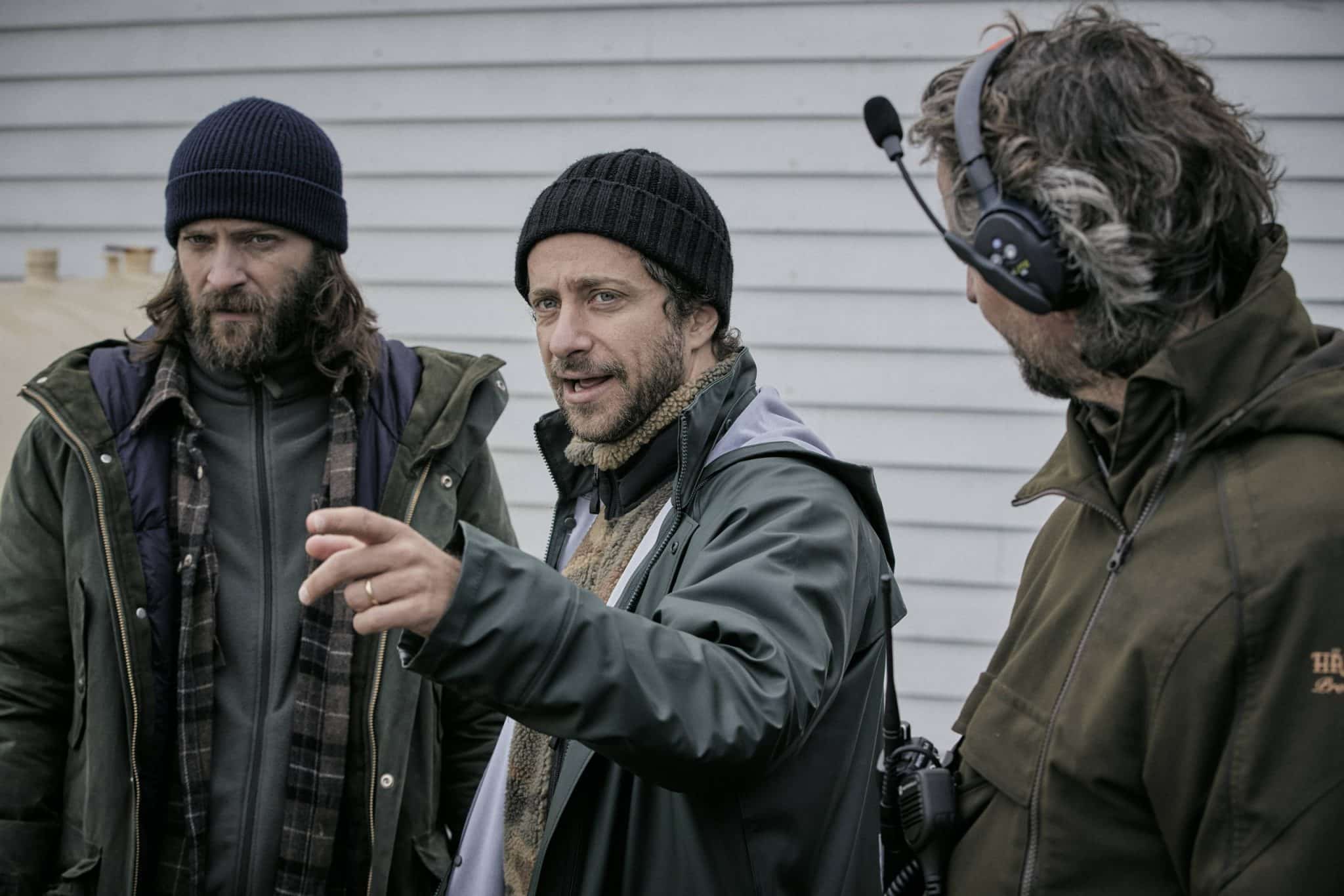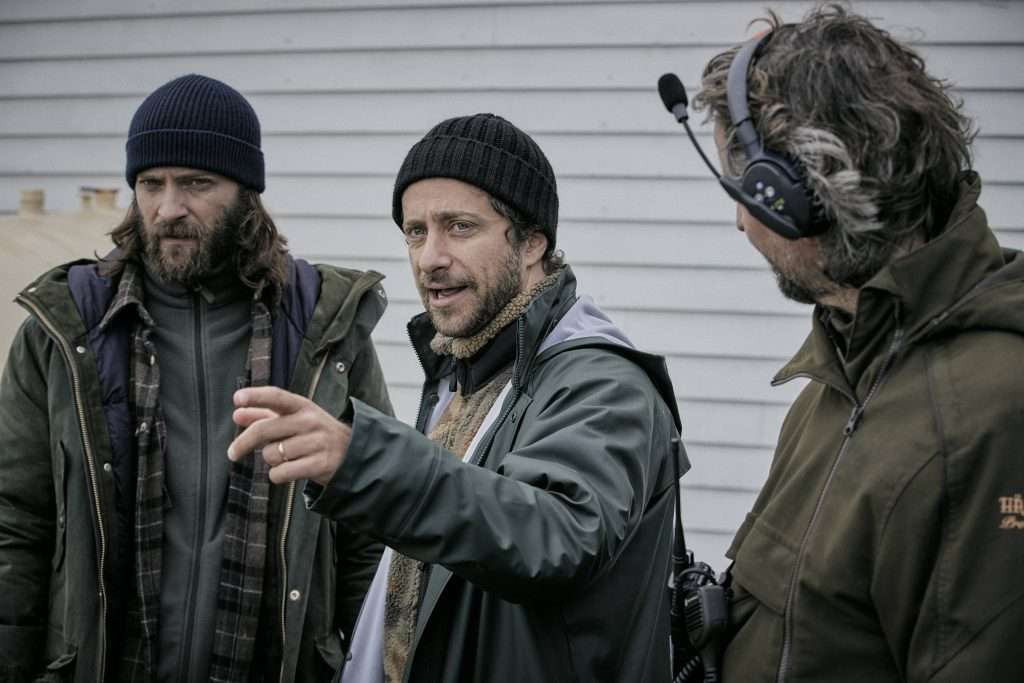

FK: The Hanging Sun is a screenplay adapted from a Jo Nesbo book. How did this project come about?
Francesco: I had just finished my documentary [Franca: Chaos and Creation], and I received a phone call from someone who had seen it and was related to someone I was already working with, and they said they saw my film, and asked what I wanted to do next. My answer was, I just want to make movies. I did this documentary because it was a very personal project, but I didn’t really see myself as a documentary filmmaker.
This guy, Steve Rabineau, turned out to be an agent at the time, and his wife, Sylvie, represented Jo Nesbo. She passed the novel on to me. I read it and fell in love with the atmosphere and the characters instantly; they are all lost souls who are trying to find some grounding, and that’s how I felt at the time. It was a very strange period in my life, because I had just lost my second parent, I was very lost. This character—who is in search of himself, or that suddenly finds himself, or is in the process of doing so—fascinated me. I wrote a treatment and sent it to Jo and he thought it was interesting. We met a few months later in a cafe in Santa Monica and we got along. That’s how it all started.
FK: What was the process of shooting the film like?
Francesco: We scouted all the main locations in June, and then I was back from the end of July and I spent about a week or two in Oslo. Then I just checked myself in the hotel where I stayed for the next three months. We were literally on an island in Norway for three months.
FK: Was it challenging working during COVID?
Francesco: We’re still doing COVID! But no, this wasn’t at the height of it. It was still hard because, for example, Jessica Brown Findlay, the actor who’s playing Leah, got COVID just before the start of the shoot, so we had to reschedule. So, I would say yeah, it was during the pandemic.
FK: That’s one for the books.
Francesco: It was amazing because we had just lost an actor to play the dad, and we were looking for someone to replace him. So, I had one of my two leads with COVID. And then I had no dad. The guy who played him fell through and then it all works out because in film there’s this magic—there’s a God that protects filmmakers, I think, that makes them finish their projects.
FK: Somehow yes! Perhaps there’s some kind of therapy in this filmmaking process for you? I know you mentioned that all the souls were lost souls in the story, and you felt a little bit like that at the same time. Going through this process do you feel a sense of closure, especially because losing the “father” character (as the actor), running parallel to what you’ve been experiencing in real life?
Francesco: Yeah, it’s funny—I don’t remember who said it, but I once read that, in a way, to grow up you have to kill your parents. That’s obviously metaphoric. But in my case, the death of both my parents made me an adult and responsible in a different way than I was before. This film is really about fatherhood. It’s also about how violent and male dominant our society has been. And it’s about dogma. It’s about many things, but it’s about choosing your own family. I think it was quite symbolic, yes, that I lost the father character just before starting. My wife was six months pregnant when I left to make the film. I came back just a week before the beginning of his birth, the beginning of his life, so it’s quite a milestone.
FK: What were some of the challenges you faced filming in Norway? Were you checking Google Weather every single day?
Francesco: You know, it’s so unpredictable, that it doesn’t matter what the weather forecast says there. That’s one of the first things they tell you. So, with this being my first Narrative Feature, together with COVID, and with the personal challenges and a few production challenges, we had a ‘weather challenge’ that manifested in every possible way. For example, we’re in a small house shooting at the edge of the world, and the wind starts blowing. So, you can’t record dialogue because it’s too loud. There was one scene we had to bring inside on a rainy day, and I wanted to shoot another scene that was kind of related to it back outside. Because why go to Norway, otherwise? And that day we had two thunderstorms. We had a double rainbow three times! It was almost, like, funny, you know, the crew was laughing. And I was just cursing everything.
FK: It sounds like a Monty Python sketch.
Francesco: It really was, and they were like: you’ve got to stop cursing, because this is not going to help you. But I remember that day was probably the most challenging nightmare of my entire career. That includes photography, commercials, music videos, you know, everything I’ve done before—I never had a day like that. The weather was so challenging but the setting was so rewarding on screen. The visuals of the film have ended up looking poetic and at the same time violent, like the main characters.
FK: When you hit rock bottom the only way is up. Once you get that out the way everything else seems a breeze [weather pun, I’m afraid]! This is your first feature alone, right?
Francesco: My other feature film was a documentary. So, this, I would say, is definitely my first Narrative scripted feature. But the journey to this film has been long. In fact, I’m officially presenting my first film, the day after I turn forty this September. So, I’m not young…
FK: I find it really fascinating how all these roads are very symbolic for you and are all leading to Venice. You mentioned that you went to the Venice Film Festival when you were quite young. Can you tell me about that?
Francesco: I went for many years, starting in the early 2000s, just after I turned 20. I went both as an audience member, and then I went with my short film. Then, I went with my documentary, and then a VR installation, and then I was on the jury a few years ago. So, it’s my fifth official Venice and probably my 15th Because I’ve gone, I mean, almost every year since. I remember seeing Burn After Reading. The Burning Plain. The Joker. The Polanski film, what was it called? The one with Louis Garrell? It’s gonna come to me–An Officer and a Spy! Those are the ones that for some reason I have an immediate image I associate with, but I’ve seen at least thirty to forty movies in the main room. The same one where we are showing our film.
FK: Would you say, and I know that you might be biased with this answer, that this is your favourite film festival?
Francesco: Yes.
FK: Okay, right answer.
Francesco: I’ve always believed there’s so many ways of putting your content out. And there are obviously festivals that are of equal importance to Venice and Cannes. But as an Italian, Venice is the most prestigious festival. So, I’m very honoured and very happy that I have such a long-lasting relationship with the festival. Festivals, if I keep growing and going further, do have a real ability of making careers. So, I would say that Venice, as a filmmaker, has really made my career.
FK: We must ask—what are the films that have had the biggest impact on your life?
Francesco: I have too many films to name. When I think of the ones that shook me, provoked me, and that I could never forget, it’s always a hard question. If I have to name one, I would probably say Amadeus, but, wait, also 8 1/2 and Rosemary’s Baby.
FK: To draw a couple of parallels between the three films you’ve just mentioned, there seems to be a common theme of creative obsession. You’re turning 40. You’ve been on quite a roller coaster to get to this point. You’re having your birthday at the Venice Film Festival. Is creative obsession important in producing your best work? Is your 8 1/2 due in ten more years?
Francesco: It’s very complicated. It’s a very good question. One of the best questions I’ve been asked, but it’s also a very complicated one to answer. Creative obsession is, fortunately, a driving force, but, unfortunately, it is somewhat never going to fully satisfy you. Right? Because Salieri was a very good musician. Very good. There’s just then someone who happens to be that genius. And so, you start confronting yourself with certain questions when you’re obsessed with creativity—that one phrase, “are you good enough?” And that, right now, for me, is answered. I’m good enough. But am I really good? I don’t know. Can I do something that is very, very good? I still don’t know. In fact, it’s been the biggest question. It’s almost as if the door to a new room was opened when they told us we were going to close the festival. I was like, okay, great, great, great. Two days of happiness. And then “and now what?” So yes, I think it’s essential, but I think it’s essential for me and I have the conviction, and I might be wrong, that everyone who does this is, in some way, obsessed, because this is such a tough job. It’s so demanding on every level: physically, mentally. And it’s constant putting yourself in doubt, and out there to be judged.
FK: You’re vulnerable…
Francesco: Yes, very vulnerable. So, you either really are obsessed, and you really love it. And what it gives you is so much, or it’s really not worth doing, right, because obsession can eat you alive. You either have it or you don’t have it. I was born with this. And I was 12 when I said I wanted to make films. I ended up doing so many things to get to this point. Partially because I wasn’t courageous enough to confront myself with it really, and partially because life took me in other directions. When you’re young, there are a lot of distractions.
FK: You’re passionate and you’ve set the bar pretty high for yourself from the start.
Francesco: When I look back, I think “do I wish I had committed to this even earlier?” Maybe I would be further down the line, but I could never exchange what I’ve lived for a couple more movies, you know?
FK: Absolutely. Perhaps this roller-coaster journey has brought you this point now… if you’re constantly being stimulated, that is creative obsession, it brings you joy, and also brings you madness. It’s maybe just finding the boundaries between the two and going for it.
Francesco: It really is. And It’s something you do out of experience as well, and I’m sure that the best work always comes out when you put yourself personally into the material and I’m making it personal for the viewer. You can only do that because you’ve lived through some things, you know, and you felt something.



